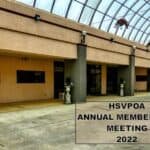The HSVPOA Comprehensive Master Plan Advisory Committee (CMPAC) Marketing Subcommittee (MSC) met on Friday, November 15, 2019, at approximately 2:04 p.m. The meeting was held in Room 3 at the Coronado Community Center.
Committee Members present were: Chairman, Pam Avila; Secretary Nancy Ornelas; Chuck Miller; and Ray Lehman. Committee Vice-chair Dan Aylward attended via telephone conference.
Committee absences were Chuck Alvord and Diane Bielanski.
Chairman of the CMPAC, Nikki Choyce was also in attendance.
Attending from staff were Chief Member Experience Officer (CMEO), Jamie Caperton. The HSVPOA BOD representative was Buddy Dixon. Okey Bess, Chairman of the Golf Committee’s Marketing, Communications and Presentations Subcommittee was present in the audience.
Press: Joe Dowden, videographer.
Additional guests were: Marcy Mermel, Maxine Klein, and Cheryl Dowden. To view the full meeting, please see the YouTube video posted at the bottom of this article.
What follows is a partial transcription, which is deemed to be a close account of the meeting.
Avila introduced new CMPAC Chairman, Nikki Choyce
Choyce: “For a whole three days now, I’ve been Chair. I am catching up. I wanted to go ahead and introduce myself and go ahead kind of set the tone for what we’re going to…happen here.”
Choyce: “I know that you all have done an incredible amount of hard work in terms of the various [unintelligible]. I am still getting myself up to speed. So if you forward the meeting minutes to me so I can kind of get myself up to speed, I’d appreciate that.”
Choyce: “We know that there are some challenges related to communication channels. We’re working through those in terms of how we’re going to get various different documents and artifacts there…Work with me on this one and we’ll figure it out.”
Choyce: “That is where the charter comes in handy; is that we can do that in a way that works well going through the CMPAC as a Chair and then from there. But we just need to figure out what that looks like. So, we will.”
Choyce: “In terms of setting expectations about moving forward, I think that everything that has happened in the past, whatever it is, and again, I am still getting myself up to speed on this one. Let’s call that done. We don’t need to do any more historical reviews. Let’s move – focus forward. After all, the tagline of the CMP is ‘Moving Forward Together.'”
Choyce: “So let’s go ahead and focus on that. There’s a ton of stuff that we need to get done in that area and I think that we do. And as long as we focus on the issues and not people, I think that there are a lot of things – good stuff that can come out of that.”
Choyce: “So setting expectations of moving forward and in that tone is where we need to go.”
Choyce: “The challenges with this committee are numerous and I want to support you in that manner. My style is typically ‘hands-off’ unless I need to be more hands-on. So, we’ll figure that out as we go there.”
Choyce: “I’ve talked to Pam and she knows that I am going to support her and you in that endeavor.”
Choyce: “But my expectation is that anything that is happening in the past that was NOT favorably looked upon, then let’s just close that door and then move forward. I think that’s good. I think I need to set that expectation because I’m learning a lot about being a Chair of this particular committee and that this is a subcommittee of the CMPAC, so that puts a lot of burden on me.
Choyce: “But unfortunately, there is only one consequence that is available to me and that consequence is that if the direction of this committee doesn’t go, and this would be true of all committees, subcommittees, my only recourse is to dissolve this committee and I don’t want to go in that direction.”
Choyce: “I wish I had other options. But that is the only option I have open to me.”
Choyce: “So setting expectations because I think that’s fair in terms of moving forward. I don’t want to blindside anybody. That’s not fair, either. But you know, we can be professional. We can be respectful. We can work with integrity. That’s what I am hoping that each of you is also online with. And we’ll move forward.”
Miller: “Nikki, I have a comment. First off, what has happened to Keith?”
Choyce: “Keith has [sic] is the J.P. of Saline County, of the Quorum Courts and he is very involved in so many things. And has so many priorities and he just found out he is going to have competition in the next election. And he needs to put some focus there.”
Miller: “Understandable. Because I see him, like Buddy, everywhere.”
Choyce: “So something’s got to give. So, this is the one that is giving.”
Miller: “Okay, one comment on what you made in your statement. I think this committee maybe ruffled a few feathers because we wanted information.”
Choyce: “Okay”
Miller: “Without that information, we could not make suggestions based upon we didn’t know what the hell happened in the past. And as a result, I think, well being there, that that, as I said, ruffled feathers.”
Miller: “My personal thinking is, we need to give you what we see. We need to tell you as we see it. We need to do it in that way. And that might not be what you want to hear.”
Miller: “We don’t want to be somebody that is just doing what the Board or the CMP thinks we ought to do. We are here to give you ideas of what we think, as marketing people, should be done.”
Choyce: “But as marketing people, you know there are many ways that we can tell the story. And they are all versions of a truth. A truth. Okay.”
Choyce: “I think that there are two things here. Ruffling feathers, you know, hey, if you live long enough, you are going to ruffle some feathers. I understand that.”
Choyce: “But, you can do it a respectful way and that is what we want to happen here.”
Miller: “I believe, speaking for myself, I don’t know the committee, I think that is what we did, submitted that way. I don’t believe it was accepted that way.”
Choyce: “But per…and then, maybe it wasn’t then. Because how you intended and how it was perceived, to me if there is not harmony in that one, then something needs to be worked on there. Okay.”
Miller: “I agree.”
Choyce: “But we have open meetings and we have to be respectful of that. We have a chain of command in terms of how information is going to be handled. And that is through me directly. And as long as it stays within that boundary, I think that we can control it.”
Choyce: “But part of that is something else that we have to work on is how, if you have a request for information, I don’t know how Keith handled it in the past, but according to the charter, that has to go through the Chair. Both ways. Request coming to you. Request coming from you. It is supposed to go through the Chair. And so we need to figure out how all of that is going to work.”
Choyce: “You know, it is not my intent to constrain you and be a bottleneck. But at the same time, it is there for a reason. So we want to make sure we are doing it.”
Choyce: “I can be the barrier that protects you, but you’ve got to work with me on this one.”
Choyce: “So, I do not expect rubber-stamping. But I also know that if you focus on issues, that oftentimes if there is a conflict there if we focus on the issue, we can take Conflict Management 101, you can take the sting and the emotion out of it. And I am not sure that that was happening in all cases.”
Choyce: “But I am not speaking with full knowledge here because I don’t know the backstories that are happening here. My intent is getting that.”
Miller: “I can say, having sat in the committee, that at no time did we ever submit anything that was to be detrimental. It was our recommendations, based upon what we found out or didn’t find out.”
Miller: “If that’s taken away from us, I don’t think we have a committee.”
Choyce: “I think that we can…I am going to have this conversation with you offline and where I see some disagreement or room for improvement. But I think that its a situation where [sic] needs to be more closely monitored in terms of how that happens until I am comfortable that we are all on the same page.”
Choyce: “I just need to know how this is working and how it is operating. And then we will move forward from there.”
Choyce: “But we are a public meeting and we need to make bigger respectful of each other and those that we’re working with. And I expect that professionalism from each of you.”
Choyce: “I don’t think that is asking too much. Especially with marketing people.”
Lehman: “I agree. I think the reverse direction is also appropriate, as well. Respect coming back to the Marketing Subcommittee. We are all owners. We all have a vested interest in doing everything we can to improve the property here.”
Lehman: “One of the places where we were not respected is in our effort to understand the marketing efforts and all that behind Ghidotti. We were told that Ghidotti is off the table and we are not to talk about Ghidotti.”
Lehman: “I felt that that is highly inappropriate since they are our marketing firm. Just wanted to find out what they are doing and how they are doing it and how they have been doing it. I think it is an important part of it, we were told.”
Choyce: “Okay. I appreciate the feedback. I am going to explore and see if I can learn anything more for you because I am that chain and communication channel. I want to know all sides of the story. I cannot make any suggestions without that. I’ve only been doing this for three days now. So, I need a little bit more time.”
Avila: “I am going to go back to something that you said earlier though, too. That is past. There is nothing we can do about it. It is behind us. We need to move forward because it is not going to change. So our view has to be a forward view at this point. And we probably learned a couple of good lessons from that experience that will affect the way we move forward, I think. But it is important that we stop thinking about that; we stop talking about it, because we can’t do a damn thing about it. That is the reality. So.”
Choyce: “And at the end of the day, making a recommendation is irrespective of who is doing it now. I mean, you can look at a problem and say, ‘it doesn’t matter if A, B, or C is in charge of that.’ The fact of the matter is, we still need to do X, whatever that is. And so taking the personalities out of it and focusing on the recommendation, in and of itself, I think that is where we…one of the things that we have been working on in the CMPAC level is, we have to remember to stay strategic. The minute you, that’s the WHAT, that’s the WHY, not the HOW.”
Ornelas: “Nikki, to that point though, without mentioning names, because we haven’t mentioned any names about staying focused on the issues and not the persons. It wouldn’t have mattered if it was Ghidotti or Company ABC, or you know, ACME Brick. It didn’t matter. The perception was we were picking on, I felt it was a picking on the company that was doing stuff.”
Ornelas: “The reason why we were so intent on getting the information about the agency was so that when we moved forward with a new agency, we were not repeating some of the same mistakes. And we understood the background of what had been tried, so many things we wanted to know. I feel like that its a two-way street. The perception is, we’re not trying to pick on one person or a group of people. It is the issue. It’s always been the issue that the team has been trying to get to the bottom of. So…”
Choyce: “But again, the way that the charter is set up and that all communications or requests for information is supposed to go through the Chair, let me help you do that. And I think with me being the center of communication, I hear both sides of the story and then maybe I can ease the way. And if it is not an acceptable…there is also a division of what the staff is responsible for. They are paid. We’re volunteers. They have to take their stand.”
[Joking about the salaries of the volunteers]
Choyce: “So let me help that. There may be things because they are the staff. They have to call the directive. We are working via the CMPAC. You know, y’all are a subcommittee of that [indecipherable]. Let’s work on those logistics and see how to do it.”
Choyce: “But regardless, let’s focus on the strategy. Let’s focus on the why and the what. And then maybe next year, when we get a lot of these list…things that we have to get checked off, then we can start focusing on the how, based on what directives we get from the CMP and what we get from the staff. Okay?”
Choyce: “But I think that it is a time to move forward. I mean, working with some of the other subcommittees and we have…you have the list of the spreadsheet we did of the recommendations, the splicing and dicing of all the marketing recommendations that we thought were associated for the marketing subcommittee. Have y’all gone through that list and said, ‘yeah, these are ours. Nope, they are not?’
Avila: “No, not yet.”
Choyce: “That would be something that would be helpful. Because I am collecting information on what I…I want to make sure that y’all are in agreement because this was our first attempt to say, ‘hey, these are the ones that we are…’. But that is moving forward. Let’s focus on what we can do.”
Choyce: “I think that the history that we have is enough that we can go forward and say, ‘these are the recommendations that we want.’ A recommendation is that. Staff and the Board may or may not accept it. They don’t have to. But we can make those recommendations.”
Avila, “Any other questions? Thoughts?” Forward.
Choyce: “Forward it is.”
Avila, “Forward. All right.”
Priority areas for Staff Liaison, Jamie Caperton
HSVPOA hired new Community Marketing Manager
Caperton: “We’ve hired Paul Sage as our new Community Marketing Manager.” Sage comes to us from the Conway hospital where he was the Director of Marketing. Sage lives in Little Rock in a community where his wife is the Director of the POA. At this point in time, Sage is not planning on relocating to HSV. Caperton encouraged the committee to come by and meet Sage.
RFP to solicit marketing firm
HSVPOA answered all the questions and time for questions from the firms has passed. The POA elected not to solicit bids outside of Arkansas and seven proposals were sent. They didn’t want to use the marketing dollars for travel expenses. Only one firm turned down the proposal and that was CJRW.
Four areas where the POA is requesting Villager partnership
Media library development
Caperton extended an invitation for assistance from individual committee members. Staff is collecting media from a multitude of different places, including Ghidotti and the other companies the POA has worked with. This media collection includes videos and photographs.
Website evaluation/updating/mapping
“Ideal Living Magazine” conducted an audit of the POA website, “Explorethevillage.com and provided the POA with a 96-page report. This audit points out the website errors (broken links, duplications, etc.) and was part of the renewal of our contract with them for 2020. The marketing subcommittee was invited to come in and help correct the website errors.
Develop a member satisfaction tool
This will be used to determine from residents that are leaving the Village the reasons for their departures. The POA also wants to survey residents to determine what they love about the Village and the reasons for staying. There is a June deadline for this tool.
Contact the 1,511 unbuilt golf and lake lot owners
The POA wants to ask these Property Owners what their projected build date is so that there is an understanding of the number and time frame of potential builds. Staff wants to determine what incentives can be offered for building on these lots.
Community Marketing Manager is assuming some of Ghidotti duties
We’ve pulled back all of the social media. Joseph Price is working on that area and also the website repairs recommended by “Ideal Living”.
Paul Sage is working to develop relationships with different media sources. Sage is also working on the “Media Buy Pull” from Ghidotti. We are now doing, inhouse, all of the media purchasing. Ghidotti charged us a 17.5% upcharge to do this task. By Paul performing this task, we will save about $24,000 per year.
Other marketing tidbits
The tradeshows are being set for 2020.
An online calendar of all the marketing efforts is being developed. This will provide transparency to the community in regards to POA marketing efforts.
The marketing budget is around $369,000 for marketing and in addition, there is a separate staff budget.
Marketing for all divisions has been combined into one effort. This will eliminate nonhomogeneous and duplicate efforts.
Old business
Status of original recommendations
The CMPAC MSC original recommendations were divided into two documents.
- Recommendations that were incorporated into the 2020 Marketing Plan
- Recommendations that were not incorporated into the 2020 Marketing Plan
Avila: “In the spirit of moving forward, unless you all have any changes to those recommendations that were not included, I would like to have a motion to move those forward to the CMPAC for passing onto the Board.”
Motion moved, seconded and passed.
Avila: “Then we are going to go ahead and take those initial recommendations and move them forward.”
Choyce: “So the process would be to email them to me.
Miller offered Choyce a hard copy to look at now but she stated she prefers email.
Aylward: “Our charter mandates us to provide to the CMPAC that document that goes through the history of marketing. What I am hearing today, I am not sure whether we are supposed to follow our charter or not.”
Avila: “I am not sure I understand your question.”
Aylward: “If we are supposed to provide a summary of the history of the POA marketing, then we would provide that document to the CMPAC.”
Avila: “That is under “New Business,” Dan.
Status of Golf Subcommittee for Marketing, Communications & Presentations
Avila stated that Okie Bess did not have a report. There was a Golf Marketing, Communications and Presentations Subcommittee which is no longer entirely needed because of the creation of a Marketing Department with staff. Marketing as a function was taken out of the Golf Committee. The Golf Subcommittee will now be focusing on Communications and Presentations. In the future, any golf marketing needs will be funneled through the staff.
New Business
Live it 365
Avila suggested the tag line, “Hot Springs Village – Live it 365”.
Avila: “Live it 365 is short. It’s sweet. It’s memorable. It can be used in so many different ways. (3 & 6 – nine golf courses) (6 & 5 – 11 lakes) (3, 6 & 5 – 14 pickleball courts) You could have phenomenal graphics on the website about “Live it 365.” You can do videos here of people here in the Village and all they need to say with the golf course in the background, the pickleball courts in the background is ‘I’m living it, 365.’
Caperton said that when we get the marketing firm on board we can give them our ideas.
Ornelas said she wasn’t aware that they made a decision that they needed a new tagline.
Buddy Dixon: “Let me interrupt. That recommendation needs to be a recommendation that y’all make if that’s what you want to do.”
Ornelas: “I am just saying. I wasn’t aware that we all had noticed that.”
Dixon: “And then it needs to go to the committee sitting here.”
Ornelas: “I wasn’t aware that we were coming up with a new tag. It is part of our committee work that we are maybe to suggest something that will go to the marketing agency.”
Review of Summary of Findings
Avila: “I am going to review the Summary of the Findings so that we can submit them to Nikki, the CMPAC, to do with as they see fit.”
Avila: “You all have seen the findings. You all read them. Are there any areas that need to be modified, changed, adjusted, whatever?”
Avila: “Was there anything that jumped out?”
Aylward: “I think its a fair representation of what has happened historically. I have some reservations about some of the comments of what is the current status because I am not sure that we know enough to be able to take a position on some of them. But, I think it is a fair representation of where we are.”
Avila: “I did send it to Jamie and I asked Jamie if she would take a look at it and she didn’t make any changes to the current status or anything so I am guessing that…”
Caperton: “I am not going to add my comments.”
Avila: “Jamie is not going to add her comments. So do we have a motion to accept that document?”
Miller: “Before we do that, Nikki in looking through here, there is a lot of [indecipherable] negative comments. Is that going to be acceptable for you to receive them, as such?”
Choyce: “No, I want it focusing on the recommendations and the issues. Nothing related to people.”
Miller: “It has no people.”
Choyce: “Mmm, I will be happy to take another look at it, but the feedback that I am getting is that there were inferences related to people, staff, etc.”
Choyce: “So just focus on the recommendations that are forward-thinking in terms of you found out this which means we now know, lessons learned. This is the direction we should be going. Not that direction.”
Aylward: “But our charter said that we were supposed to access, compile and access the history of marketing in the POA.”
Choyce: “It said that you were being [sic] knowledgable but no report was ever made, was ever documented that you had to submit a report. So the purpose and the spirit of that in the charter, as I understand it was, we all learn better from our lessons. We don’t want to repeat our mistakes. If you don’t know what you did before that was wrong, then you are more likely to repeat them. So we don’t want to repeat our mistakes.”
Choyce: “But knowing that, all that means is that you have that foundational knowledge so that you can make different recommendations, better recommendations, moving forward. So there was never, ever a…I never saw it in your charter that you said you had to submit historical findings. Only be knowledgeable so that you can move forward.”
Avila: “And we chose, because it didn’t specify, we chose to be knowledgeable by creating a Summary of Findings. That is how we chose to close out that part of it. And yes, I understand what you are saying about ‘our’ being knowledgeable about the past. This document and the findings, unless someone else in the Village has spent time going through that whole exercise that we spent all those months going through, this information isn’t available anywhere else in the Village, in the marketing department, on the Board, wherever. So this should serve as a benchmark for moving forward.”
Choyce: “I will be happy to take a look at it and we can see what the next, for review, but then I will let you know as a committee what [sic] we go from there.”
Avila, “Is that fair?”
Ornelas: “Well it is, but it just sounds like somehow we are hurting somebody’s feelings and as you said earlier, it is never the intention to put anybody on the defensive, attack or anything of that nature. It is simply a revelation and a written document that says, ‘based on what we understand, here’s what it is.’ And it was never, I think to just to make sure, that no one is receiving or perceiving it as an attack on them.”
Choyce: “I think that is where I can help there. Because I can see, you’re so close to it, as you should be, that maybe having someone who’s not as close to it to take a look at it before we go up the chain, then we can see if there is anything [indecipherable]. I am a big believer in four eye cons.”
Aylward asked Choyce to repeat her last sentence.
Choyce: “I am a big believer in the four eye cons – two sets of eyes taking a look at any document before you lock it down.”
Avila: “We’ve had seven sets of eyes.”
Choyce: “But not outside the committee. So I will be the first level outside the committee that wasn’t instrumental in developing it. So I think that that brings a little bit more, a different point of view, at least.”
Ornelas: “So just to cut to the chase then. You’re going to look at it. We want to submit it. You’re going to look at it. You’re going to make some recommendations on how to maybe make it a little bit less, if its feelings. And then you are going to communicate that back to Pam as to what maybe needs to change. But we as a committee really feel like the information is valuable and it needs to be seen.”
Choyce: “And when its in its proper form and finalized, then I am happy to go up. Until then, let’s cut and consider it in the review status.”
Aylward: “If the committee feels its in its proper form, so what you are saying is we have to self-censor what we are saying so that it doesn’t necessarily represent what we believe.”
Choyce: “No, I am not saying you have to self-censor. I am saying that it has to be…I am not going to say that you can’t do what you want, which is where [sic] I think that you are saying. But you have to have an honest point of view. But that honest point of view needs to be unbiased and it needs to be factual in terms of the issue, not the people. That is what I am going to be looking for.”
Aylward: “I think it is unbiased. I feel it is pretty unbiased.”
Choyce: “Let me take a look.”
Lehman said Nikki should be given an opportunity to look at it.
Miller: “I move that we submit the Summary of Findings of the CMP Marketing Subcommittee, November 2019, as is to Nikki.”
Choyce: “For review.”
Aylward: “Are we submitting it for review or are we submitting it as our document?”
Choyce: “The protocol is that it would go for review and only when it has passed the review, then I open it up to the CMPAC to take a look.”
Miller: “We are submitting it ‘as is’ and then she will review it and do whatever she wants to do with it.”
Ornelas: “I think there has to be some discussion about it. Yes, she is going to look at it and put her best judgment on how it should be presented.”
Choyce: “I understand that you feel strongly about it and I will definitely take that into consideration.”
Avila: “I am uncomfortable with it. I have to say that. It’s like this document is, it has to go through a censorship and I think that’s wrong.”
Miller: “Absolutely wrong. To me, it depends on the type of censorship. If recommendations from this committee are being removed, then that would be something that I would be uncomfortable with. But if pointing, potentially pointing things to people are going to injure their feelings, removing those, I am fine with that. What we are trying to do is, we’re trying to get down a report that gives the recommendations to go forward. We don’t need all the other stuff in there.”
Dixon: “That is the keyword, ‘recommendation.’
Ornelas: “I am in favor of giving you the opportunity to make sure that it is factual and that it is not going automatically be putting people on the defensive…”
Miller said he doesn’t think there is anything in the report that points out any person…
Choyce: “Let me take a look at it then.”
The motion was seconded and passed.
Starting a discussion on priorities for the next six months
Avila said this involves how the committee works with Jamie Caperton’s group. What can they do to be of benefit to Caperton’s group?”
Miller asked if they could work with Jamie. It has to be through Nikki.
Choyce: “Part of that is a protection for you. Because I know that in some cases you have been getting requests from other people, as well. And it kind of puts you in an awkward position and I would like to alleviate that for you.”
Miller: “You don’t have to worry about me. I am a really big boy. I’ve had a lot of experience being a big boy.”
Choyce: “But it is also a protocol, so I know what’s kind of happening and all that kind of stuff. The fine line we have to walk is, how do we control things in a manner that is according to the charter, but not become a bottleneck for you doing your work. That’s what I need help figuring out. As the liaisons, they could be working with you. I mean, you have to tell me how I can be helpful to you, but not be a bottleneck. But we’re a little bit constrained by what’s in the charter in terms of how it says, pretty much all communications written and otherwise have to go through the committee, not from the subcommittee. So I guess we have an opportunity. But I think that is the template that comes for all subcommittees…
Lehman: “May I ask a question that is a little off subject? It has to do with the CMPAC at the last meeting. There was a discussion in the last meeting of where the MSC should reside. It was going to stay with the CMPAC or if it’s going to go somewhere else. Has there been any further discussion about that?”
Choyce: “No. And I know that that’s something that Keith felt very strongly about, but I don’t know if the rest of the committee feels strongly about that. But you know, it is one of those things. It is your committee. If you have some thoughts, we can talk about that too. But for right now, it was put under the CMPAC for a reason. I mean there is a whole section…”
Lehman: “It makes perfect sense to keep it there.”
The committee discussed whether they are allowed to communicate directly with Caperton.
Dixon highly recommended that the subcommittee study its charter, “because in some cases, you are acting outside of your charter. You need to come back, have some guardrails and pay attention to your charter. It outlines how you are supposed to do things. And when you start going away from that, that is what creates some of the problems.”
Avila: “Could you help illustrate where we are outside the charter?”
Miller: “It says limitations, number F, subcommittee members are not authorized to submit minutes or unofficial reports to anyone other than the CMPAC Chairperson.”
Dixon: “That’s one. But if you go up and look, it says, ‘support staff, be well-versed in the understanding of the CMP objectives, make recommendations,’ several times in here it refers to make recommendations and you all are to make recommendations, submit those to Nikki. Nikki looks at them and her committee looks at them and then they decide whether those recommendations should go forward to the staff and the board. That is the way it is.”
Avila: “I understand that and it makes sense. However, to make recommendations, we need to know what’s going on. We need to know what they are doing so that we are not sitting there, spending time and energy recommending something that they are already doing.”
Dixon: “Jamie has told you what they are doing.”
Avila: “Only in the most broad terms.”
Dixon: “Well.”
Choyce: “And this is, I am fairly new at this, but as an idea, so isn’t that what this meeting is for, to open up communications so that we have this opportunity to have the conversation so that you can ask Jamie, you can ask Buddy. That, we are all here together and I think that that works. Now outside of these meetings and the requests come in, I think that that is where we have to go the charter. But I don’t think in this environment unless I am misunderstanding, that you all can ask Jamie what she wants. I think that would be something we could do here.”
Dixon: “I think each one of the committees at one time or another has been in to talk to you and you’ve asked for help, right? We’ve got no problem with that.”
Choyce: “Again, finding the fine line between going with the charter and not being a bottleneck. Because I don’t want either one of those extremes. I want to help you move forward.”
Miller: “I just asked if everything has to go through Nikki. Jamie had asked me to write a blog.”
Dixon: “That’s fine. But this lady [Nikki] needs to know about it.”
Miller: “I am not going to call her and tell her I am writing a blog. Let Jamie do that.”
Dixon: “As long as she is aware that you are doing that and working with Jamie. Just keep her informed.”
Miller: “I didn’t hear that.”
Dixon: “That is what I meant to say.”
Dixon said that everyone on the committee has special talents that Caperton could use. “But when you start making recommendations and that, according to your charter, there is a certain way that has to work. And that is all I am asking is that you stay that way.”
Miller: “As somebody who has been writing for 20 years for a magazine and never had it edited, period, I don’t want to get into a situation where I am talking about the Village and have it edited. I am not going to do that. So I don’t know what…”
Dixon: “That is between you and Jamie.”
Ornelas asked Caperton if she had any ideas on ways the committee members could help.
Caperton said they would come up with a “Forward Together” plan of action with Choyce and Avila to determine where the committee can assist staff. Possibly the three of them can sit down before the next meeting and determine what is needed.
Choyce: “And in the meantime, I mean if you just wouldn’t mind, if you are having communications, if you would just cc me on it so I can kind of be in the loop.”
Avila: “We will come back…I will come back at the next meeting after I meet with Jamie and Nikki and we will have our marching orders going forward.”
The next Marketing Subcommittee meeting date was discussed. Due to the upcoming holidays, it was determined a poll would be taken to find the best date and time.
Audience questions were answered.
HSVPOA CMPAC Marketing Subcommittee Charter
CMPAC-Marketing-Subcommittee_Charter-6-19-19HSVPOA Marketing Subcommittee Meeting 11/15/19
By Cheryl Dowden, November 18, 2019












Tom Blakeman
11/18/2019 — 4:12 pm
This is interesting. It would appear that full control of this Marketing Committee will be taken over by the chair of the CMP Advisory Committee. Nothing goes in or out without censoring. Recipe for disaster.
Why would anyone want to be on a committee where you can’t say anything, get information, or do anything or recommend anything without going through “the boss” first.
And, OMG, they aren’t supposed to get any information on what was done in the past? How can you know where you might need to go if you can’t know where you’ve been?
It would appear that the good work the committee did previously was not received well by the POA leadership so now the lid is being screwed down.
Mary
11/18/2019 — 6:54 pm
Looks like a great example of censorship and a reason a lot of people don’t want to be on a committee.
Anonymous
11/18/2019 — 8:57 pm
Moving forward together? The CMP is not moving forward at all. Chain of command? We are a retirement community and are not taking orders from anyone ever again. Together? No way! Marketing has ripped us off at least 10 million in the last couple of years with no results. The way that the charter is made up? Made up by the illegal governance committee controlled by the CEO who is controlled by DPZ. Not even material for comedy Central.
Cindy Anderson
11/18/2019 — 11:05 pm
Seems like “A lot to do about nothing” to me and a lot of BS. Don’t like it at all!
Nalleyville
11/19/2019 — 9:06 am
And so it goes. The gulf between this “leadership” and the people funding this group of progressives
grows ever wider.
Let’s start a campaign to have our votes counted in a fair and indisputable end result and they will eventually fail.
This is a marathon.